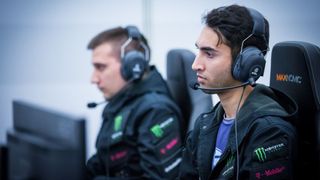Dota 2's latest roster drama isn't the end of the world

A column documenting Chris' complex ongoing relationship with Dota 2. To read more Three Lane Highway, click here.
It's been a dramatic week. The arrival of this year's Spring Cleaning update has been roundly overshadowed by the professional scene's most recent rosterpocalypse. If you were trying to figure out the optimal conditions for dramageddon ahead of the Manila Major, you could do worse than: Arteezy and Universe out of EG; Arteezy and Universe to Secret; w33haa and Misery teamless with days to go.
EG and Secret have been close to the centre of the western scene's drama and politicking for the last two years, and this week's news ensures that they'll stay that way through this year's International at least. As with any situation like this one, it can be hard to find the line between truth and narrative. What we have is certainly a concerted effort by Secret to build the squad they believe has the best chance of winning The International. It's tempting to additionally frame this as a nefarious plot by Puppey to dismantle a key opponent at a crucial juncture, but that's dramatising the facts.
These decisions don't get made overnight, after all, and nobody has been kidnapped. There are players, captains and managers who believe that upsets like this are necessary in order to safeguard their futures, and so upsets like this happen. Dota 2 is a high-stakes game, and tough decisions get made when there are millions on the line.
As David 'LD' Gorman pointed out on Twitter, the Major system was supposed to make the scene more stable. It clearly hasn't. I'm not sure that it's made the scene less stable, however—the impact of these roster lock periods seems to be to cram what would have otherwise been months of roster drift into a few dramatic days. The changes are more shocking thanks to a system that gives drama a deadline, but I'm not convinced that the system itself is responsible for those changes. The western Dota 2 scene was relatively stable until The International 2014, and then became incredibly unstable in its aftermath—a full year before the Major system was introduced. The aftershocks of that period are still being felt: after all, many of the same teams and players are involved.
It's not the same all over. OG have an air of that old-school Dota stability about them, and in the immediate aftermath of the Frankfurt Major n0tail explicitly credited their victory to the strength of the bond between all five players. If you're a spectator looking for a power-of-friendship narrative in modern Dota, you can find it there. You could also find it in Alliance, who have reformed the old guard after a few years of experimenting with abruptly dropping people.
The point isn't that these teams are doing it 'right' where Secret are doing it 'wrong': it's that there are multiple philosophies about how to build and manage a championship-winning team in modern Dota. Is this a bad thing? I'm not so sure. It's certainly the seed for a lot of great contests in the year to come. If Secret win this year's International, then the grand experiment will have worked—and you'll have, in Puppey and Universe, the world's first two-time champions. If they lose (particularly if they underperform like they did last year) then the apparent ruthlessness of this week's reshuffle will have laid the foundation for a tale of hubris and tragedy. It's a story to tell either way.
I wonder if, in some way, a lot of this drama stems from unreconciled disappointment with the death of 'classic' Dota 2 after TI4. There'll always be people who see Puppey as part of that original Na'Vi dynamic and who struggle to accept a new scene where he's heading up a machine built to win Internationals. There's been a loss of innocence, a shift from heart to brain. That's what happens when you put $18m on the table.
The biggest gaming news, reviews and hardware deals
Keep up to date with the most important stories and the best deals, as picked by the PC Gamer team.
Short of a massive and unimaginable change, I don't think those days are coming back. Dota 2 isn't going to move to $1m prize pools and salaried season play. It's not going to become League of Legends, no matter how many range indicators Valve adds to the game. Dota 2 is now a game where stability exists alongside serious volatility, and where both of these approaches deliver results with enough frequency to ensure that neither of them goes away.
There are certainly improvements to be made. Even if I don't think the Major system has forced roster changes that wouldn't otherwise have happened, it has played a role in making those changes more painful for the players involved. If some of the best players are left stranded by a last-minute reshuffle prior to a hard deadline, then the entire scene suffers: including the lower-tier teams who should be benefiting from mobility among the top talent. In effect the opposite has happened—it seems more or less certain now that these sudden changes to Secret and EG have caused a power vacuum that has ripped Digital Chaos apart while w33ha and Misery remain teamless. These are issues of player welfare that require serious practical consideration.
Even so, I've spent much of this year being struck by the health of the international Dota 2 scene and this week's upsets haven't changed that. This is still a scene that allows fresh talent to transition from pubs and win championships. It's still a scene with meaningful regional diversity, and unless the rise of MVP presages total Korean dominance of the game, which it probably doesn't, then they are a perfect example of how dynamic Dota 2 can be from year to year.
The standard of play has never been higher, the stakes have never been higher, and the scene has retained these qualities regardless. That is a good reason to remain, or become, a fan. But a consequence of volatility is change, and change makes it hard to be a fan of just one specific thing. The more of the big picture you take in, however, the better everything looks.

PC Gamer Pro is dedicated to esports and competitive gaming. Check back every day for exciting, fun and informative articles about League of Legends, Dota 2, Hearthstone, CS:GO and more. GL HF!
Joining in 2011, Chris made his start with PC Gamer turning beautiful trees into magazines, first as a writer and later as deputy editor. Once PCG's reluctant MMO champion , his discovery of Dota 2 in 2012 led him to much darker, stranger places. In 2015, Chris became the editor of PC Gamer Pro, overseeing our online coverage of competitive gaming and esports. He left in 2017, and can be now found making games and recording the Crate & Crowbar podcast.
Most Popular

